White oil manufacturers
White oil manufacturers charge a lot for what is so simple to make yourself. Okay I will confess it up front; there is only one person who should be making this stuff that controls the sap-sucking and chewing pests in your garden and that is you.
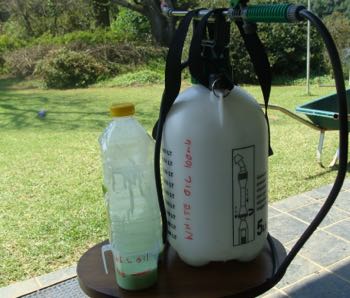
Can you mix together cooking oil and dish-washing liquid, pour it into a
two litre plastic container and give it a good shake? Then you are able to make white oil.
Why would you want to approach white oil manufacturers for their product which costs ten times as much? Do it yourself.
This page was last updated by Bernard Preston on 3rd April, 2025.
- 2 cups light cooking oil
- 1 cup dish-washing liquid
These blood suckers can cause havoc with your citrus trees, broad beans and roses, for example, spreading viruses that then attack your favourite plants.
I will have to confess it; for three years I spent hours mechanically scraping white fly and aphids off the leaves of our citrus trees with a thumb nail. Then an Australian cousin who was visiting told me about white oil.
Just one spray taking five minutes per tree, removes 90 percent of the bugs by asphyxiating them; and a second a week later annihilates those that survive.
This is not the greatest graphic. On the right is a five litre spray bottle, on the left another plastic container and in the foreground a measuring jug with 100ml of the white oil. I will add it to around a gallon of water; that is a 2% mixture.
Give it a good shake and away you go. Fill the spray bottle near to the top incidentally.
It takes about five minutes per tree to spray against the sap-suckers, depending on how large it is.
Although we are trying to wean off plastic, the root of many environmental evils, my old spray can has rusted through and I have bought a new one; reluctantly the old bottle went to the dump.
- 2% mixture: 100ml white oil / 5 litres water
White oil manufacturers
White oil manufacturers are for a safe mixture for controlling many of the bugs that attack your citrus and roses, for example. If you are wanting to avoid toxic insecticides that might affect you, then this is a good option. It is very effective; death by asphyxiation not poisoning.
The material expressed on this page is gleaned from the nutritional and environmental literature; it is clearly referenced. A plain distinction is made between the author's opinion and that which is scientifically proven. When in doubt consult your health professional.
To suggest a correction or clarification, write to Dr Bernard Preston here. Contact.
If you are an organic gardener like me, then you will be reluctant to use toxic sprays to kill these aphids and white flies. Then you also destroy the ladybirds that feed on the sap-suckers; and the peckers that feast on all these tiny insects.
Just this afternoon I sprayed eight citrus trees with white oil. A not inconsiderable amount drifts onto you and you inhale some of it too. Those toxic chemicals kill the bugs but do they not also affect our own well-being?
White oil though is harmless.
When spraying with Roundup now, the only poison that keeps the weeds from sprouting around the pool, I wear the full regalia, including the gas mask for when using the sanding machine. They have admitted it causes malignant tumours, albeit in large doses. I have no desire for even a small cancer.
Make sure you spray both sides of the leaf, especially the lower part where the white flies tend to congregate. The aphids prefer the stems of young shoots.
Last year an unknown pest, I think a stink bug, attacked our pole beans leaving nasty black spots all over the fruit. This year I am going to use our white oil on the young shoots and see if it helps.
Okay so here is the deal. Find a plastic two litre bottle.
- Two parts of a light vegetable oil.
- One part of washing up liquid.
Give it a good shake and, hey presto, you are a white oil manufacturer. It is not rocket science keeping these little menaces under control. Your mixture starves them of oxygen and they die a horrible death from asphyxiation. If that bothers you, give up gardening.
Here is an update; we then got hens and they helped sort out the pests that were attacking our beans.
Then there are bean leaf beetles and a host of sap-sucking bugs that attack both the leaves and the fruit. Asphyxiate them with your white oil.
Dilute your white oil
It is highly concentrated, so dilute your white oil by adding 100 ml of the concentrate to five litres of water in a spray bottle; that is 2%. My cousin who is a citrus farmer recommends not going over 3 percent. Then spray it onto both sides of the leaves; concentrate on the young shoots.
Turn the nozzle upside down to spray upwards where most of the sap-suckers will be found. Repeat in a week. You will be stunned how successful it is on citrus.
Again my cousin says not to spray more than twice a year; he has been using it for decades, so I am sure he has got good reasons for saying so.
Before white oil
This is what a lime leaf looked like before white oil.
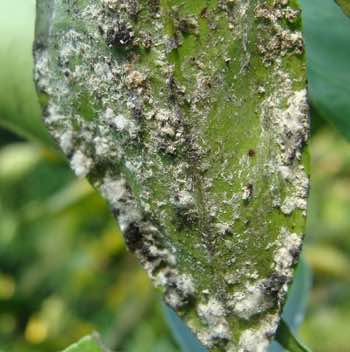
After white oil
And this of course, is the appearance after white oil; the bugs are quite dead; asphyxiated, but not poisoned.
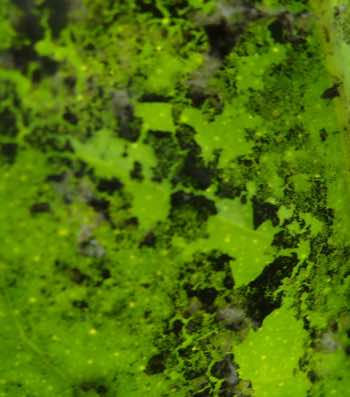
Notice how the parasites turn black as they die and then peel off the leaf.
Here is an update for you. It is now three months since I sprayed and there is not a sign of white fly.
It is midsummer and I am going to spray again soon; flowering is over and the new fruit has set.
And another update; it is now three years since we became part of the white oil manufacturers; I can mix together two parts plus one of another of two harmless liquids. It does not take a chemistry graduate or cordon-bleu cook to do that.
What is interesting is that we have had much less of a problem of aphids on our broccoli, even though we never sprayed it; the citrus trees had become the breeding ground for many sap sucking bugs in our garden. We may even get to try Brussels sprouts again.
It is all about our philosophy of natural pest management.
Black aphids on broad beans
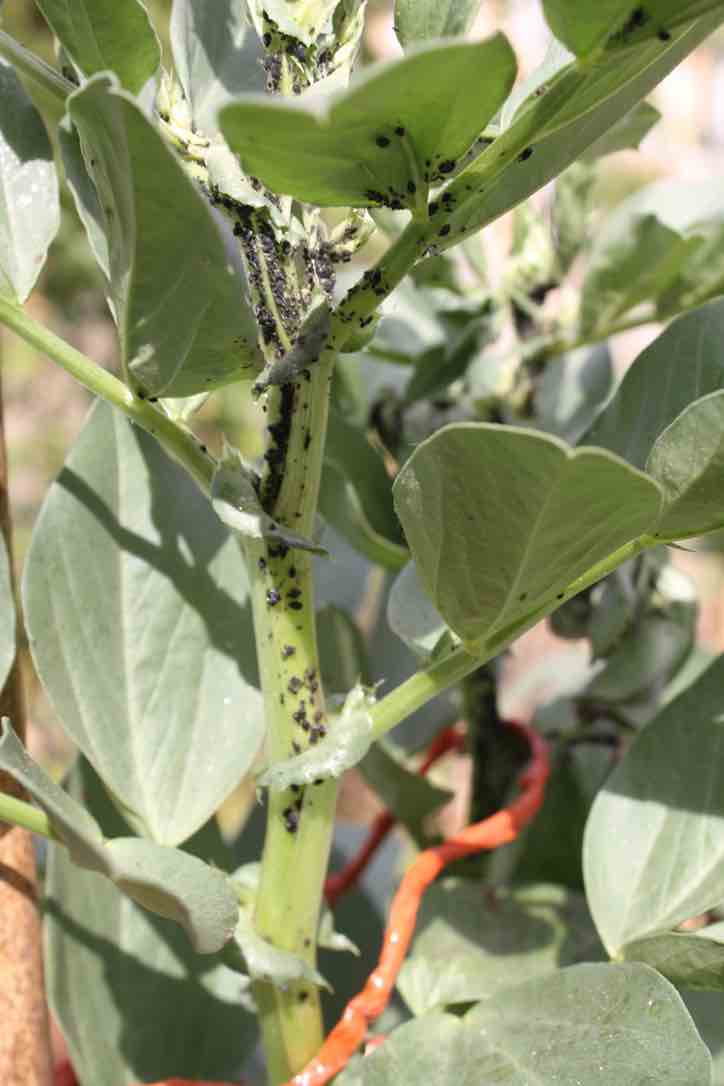
Black aphids on broad beans are another story. Watch out for these little suckers because if you do not catch them early they will destroy the whole plant.
I use double strength white oil and you may need to repeat it several times. Cut off any badly affected branches and burn them.
These are mean little insects.
Growing lemon trees
Growing lemon trees is so easy. Dig a hole, fill it with compost and a bit of lime, and plant the young sapling; but you will need to become one of the white oil manufacturers.
Oranges, limes, and mandarins are superb for any garden; and grapefruit also, but it is too cold here at nearly 4000 feet above sea-level for the latter.
We enjoy a mixed citrus drink for most of the year, buying in when there is a glut on the market and keeping our own for when the commercial season is over. Your white oil is vital for them. Aphids and other bugs will stifle the life out of your plants.
Growing lemon trees, so goes the old adage, should be your first action in the garden when you move into a new home; well, one of them anyway. I like a lime too; the flavour is rather different and the fruiting season doesn't entirely overlap so you have a much longer season for cordials like this spicy ginger tea drink; I add a little lemon and half a teaspoon of raw honey.
If you want to do it properly, growing lemon trees is hard work initially, but it pays off with the tree bearing sooner than if you plant a pip, prolifically and for years. It means digging a hole one metre square, and another deep.
And without white oil manufacturers, the bugs spread viruses that will destroy your trees.
Lime nutrition
Lime nutrition is a wonder protecting us from cancers, gum disease, nerve dysfunction[1] and promotes healing of tissues, such as after a slipped disc or sprained ankle. Limonin is the substance that is unique in citrus, giving it the sour taste, and of course vitamin C is important in many enzyme reactions in the body. None of it can happen, though, without your white oil manufacturers.
If only for their bioflavonoids that mop up the free radicals that destroy our DNA causing cancer, lime nutrition is a wonder. Not a day in your life should pass when you don't have at least a couple teaspoonfuls of fresh citrus juice, and the pulp too remember.
There is great interest right now in the scientific medical world about the value of citrus pectin in preventing cancer; most of it is in the pulp; we never use the strained juice consequently[1].
Flowering
Do not use your white oil whilst the citrus is flowering; whether the bees do not like the smell, or the flower is covered in oil making fertilization more difficult, it makes no difference; it will affect the yield.
Aphids
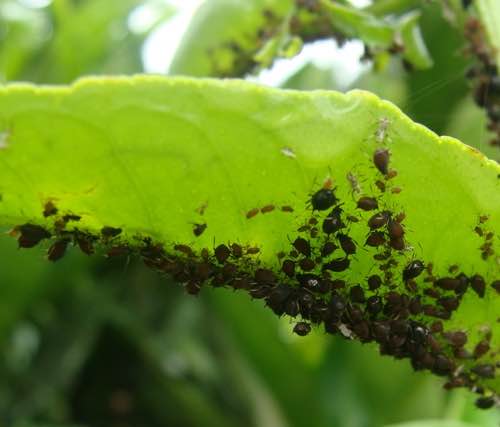
I sprayed these aphids yesterday, 23 January, 2017. I will take another photo in a few days. It took 8 litres of the diluted mixture to spray 11 citrus trees, two quite small. Our citrus fruit list is quite extensive for a suburban home garden.
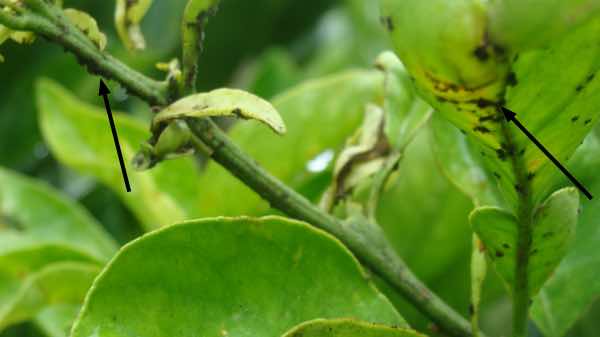
The aphids, arrowed, are quite dead, asphyxiated by the white oil; I scrape them off with my thumb; it may need to be repeated in a week or two.
- Lime nutrition juice together with olive oil makes the perfect salad dressing.
- Mandarin orange tree.
Bernard Preston
Bernard Preston is a semi-retired doctor, passionate about not the cure, but the prevention of illness. With 11 citrus trees in the garden attacked by aphids, the development of this white oil manufacturers page became vital.
Helen and he starting growing lemon trees the moment they built their home in the Midlands of South Africa. Now they have plenty of citrus fruit bar grapefruit which really needs a hotter climate.
Lime nutrition only became a passion after he was introduced to them by his Dominican Republic brother; what a wonderful fruit.
I mentioned above that I was going to try this white oil on our green beans; that have been seriously attacked by the Mexican bean beetle. However it is not going to be necessary; since acquiring and allowing our free range hens to wander in the veggie garden for a couple hours every day, under supervision or they destroy the seedlings, we have little further hassle with that bug. In fact I think the white fly is generally much less of a problem too.
I call it the synergy of green living; you let some hens loose that you have acquired for cage free eggs and, hey presto, you have much less of a problem from cutworm larvae and other beetles and bugs. Your kids will love this story in pictures of what do tadpoles eat. It is all part of what is known as backyard permaculture; working with nature instead of against it.
When browsing use right click and "Open Link in New Tab" or you may get a bad gateway signal.
Newsletter
Our newsletter is entitled "create a cyan zone" at your home, preserving both yourself and Mother Earth for future generations; and the family too, of course. We promise not to spam you with daily emails promoting various products. You may get an occasional nudge to buy one of my books.
Here are the back issues.
- Lifestyle and ideal body weight
- What are ultra-processed foods?
- Investing in long-term health
- Diseases from plastic exposure
- Intensive lifestyle management for obesity has limited value
- A world largely devoid of Parkinson's Disease
- The impact of friendly bacteria in the tum on the prevention of cancer
- There's a hole in the bucket
- Everyone is talking about weight loss drugs
- Pull the sweet tooth
- If you suffer from heartburn plant a susu
- Refined maize meal and stunting
- Should agriculture and industry get priority for water and electricity?
- Nature is calling
- Mill your own flour
- Bake your own sourdough bread
- Microplastics from our water
- Alternative types of water storage
- Wear your clothes out
- Comfort foods
- Create a bee-friendly environment
- Go to bed slightly hungry
- Keep bees
- Blue zone folk are religious
- Reduce plastic waste
- Family is important
- What can go in compost?
- Grow broad beans for longevity
- Harvest and store sunshine
- Blue zone exercise
- Harvest and store your rainwater
- Create a cyan zone at your home
Did you find this page interesting? How about forwarding it to a friendly book or food junkie? Better still, a social media tick would help.
Address:
56 Groenekloof Rd,
Hilton, KZN
South Africa
Website:
https://www.bernard-preston.com